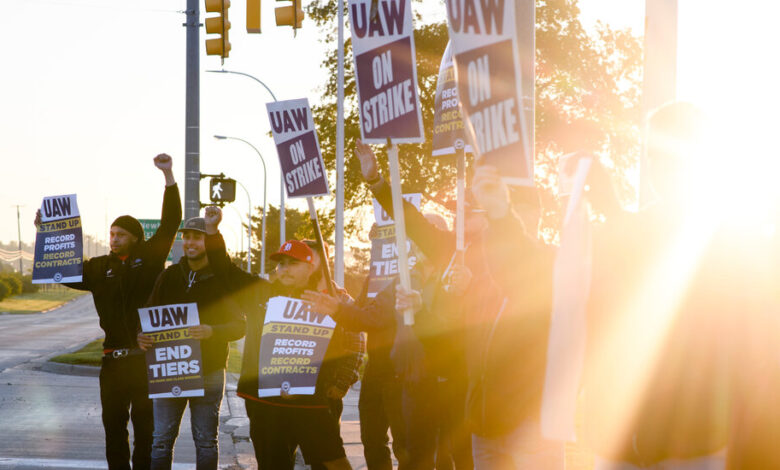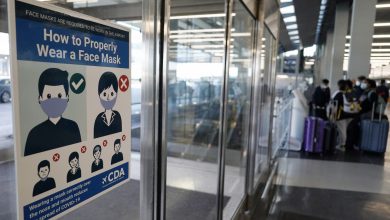A Spirited Start to the U.A.W. Strike at a Ford Plant Near Detroit

Rodney Cornett got up at 4:30 a.m. on Friday, hopped in his F-150 pickup and reported as usual for a morning shift at the Ford Motor plant in Wayne, a gritty city just west of Detroit.
But this morning Mr. Cornett, 56, a veteran union member who has worked at Ford for 28 years, wasn’t heading to the axle assembly area where he’s a team leader. Instead, his work was putting in six hours on the picket line with a dozen co-workers at the plant’s Gate 1 as part of the strike called by the United Auto Workers late Thursday.
“We really haven’t had much of a raise in 15 years,” Mr. Cornett said, holding a sign that read, “Fair Pay Now!” while cars and trucks constantly whizzed by, honking in support of the strikers. “We’ve gone through several contracts, and the company keeps saying how they’re hurting, but they’re making record profits. It can’t be the status quo.”
The U.A.W. has been negotiating a new labor contract with the three Detroit automakers, but since the sides remain far apart on wages and most other issues, the union called a strike that began when the current bargaining agreement expired at midnight.
In a first, the U.A.W. is striking against all three manufacturers — General Motors, Ford and Stellantis — but has limited the stoppages to one plant at each of the companies. At Ford’s Michigan Assembly Plant in Wayne, only the 3,300 workers in the assembly area and paint shop have walked off the line, but that is enough to idle the factory.
All 5,800 U.A.W. workers at Stellantis’s Jeep complex in Toledo, Ohio, and 3,600 union members at G.M.’s pickup truck factory in Wentzville, Mo., also went on strike.
While limited, the strike will have an impact on the automakers. The affected vehicles are among their most popular and profitable. The Ford plant makes the Bronco, a rugged sport utility vehicle, and is preparing to make a new version of the Ranger pickup. Jeep makes its Gladiator and Wrangler models in Toledo. The G.M. plant produces the Chevrolet Colorado and GMC Canyon pickups.
The U.A.W.’s president, Shawn Fain, said the union could extend the strike to additional plants if the talks failed to produce an agreement. “That will supercharge the leverage we have in negotiations, and will create confusion for the companies,” he said in a video streamed on Facebook on Thursday night.
Mr. Fain joined workers outside the Ford plant in Wayne after the strike began at midnight. The union broke off discussions with the companies for a day but said it expected the talks to resume on Saturday.
The union has demanded wage increases of 40 percent over the next four years, roughly the same pay gains the chief executives of the three companies have seen over the last four years.
Among its other demands, the union wants to end a pay scale where new hires make about a third less than the veteran wage of $32 an hour and have to work eight years before reaching the top of the pay scale. It also wants the companies to pay for health insurance for retirees, offer more paid time off and provide pensions for workers who now have only 401(k) savings accounts for retirement.
The companies have offered wage increases of roughly 20 percent but have denied most of the union’s other wishes.
At the Ford plant, several strikers said a raise of 30 percent or more was needed to make up for concessions that the union had to make in previous years to help the automakers survive the 2007-8 financial crisis.
Jason Vinson, 42, a forklift driver, started as a temporary worker in 2007 making about $17 an hour, then worked his way up to $25 until he was laid off. When he was rehired in 2012, he had to start over at $17 an hour, he said.
“I had to get used to it, just pay the necessities,” he said with a shrug. Now he earns $32 an hour, he said, but thinks a substantial raise is warranted because of the profits his plant generates and the sacrifices he made in the past.
The strikers, many wearing red T-shirts, waved placards and acknowledged honks of support from passing motorists. The picketing is being conducted in six-hour shifts; the plan is for union members to take on one shift per week.
Drawing on a strike fund of $825 million, the union will pay the striking workers $500 a week and cover their health insurance premium. That helps, but still puts some workers in a pinch.
“I’m getting rid of my cable TV,” said Diana Osborne, 42, an assembly worker who has worked for Ford for 16 years. And her 18-year-old daughter, who just enlisted in the National Guard, has offered to lend her money if things get really tight.
Mr. Cornett, the team leader in axle assembly, makes $32 an hour but said he fretted about sending his son to college. If he works 40 hour a week, he will earn about $67,000 a year. “There’s college, plus property taxes are going up, the price of gas is through the roof,” he lamented.
Aside from a raise, the thing he wants is an end to the tiered wage system, under which newer workers and veterans are paid on different scales, saying it’s “disheartening” seeing colleagues doing the same work while making $22 or $24 an hour.
“We all labor hard,” he said. “You have a precise amount of time to do your job on the line, and our jobs are timed to the second. When the line starts, it doesn’t stop until we go on break. A lot of new hires come in and they have aches and pains, the same aches and pains that I have, so they should get paid the same as me.”




